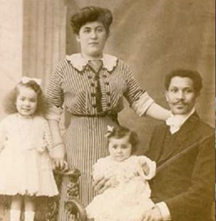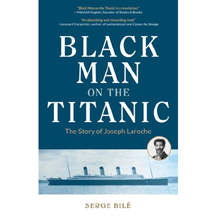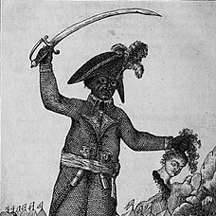I found interest in
journalist Serge Bile’s “Black Man on the Titanic – The Story of Joseph Laroche,” because I thought a walk through its pages would allow me to wander into history from an Afro-Francophone versus Afro-Anglophone experience. The Ivorian-French writer allowed me to do just that.
Unlike many, I have not seen James Cameron’s movie version of the Titanic and as Bile told the story of Haitian Laroche, the only Black man on the Titanic, my interest in Cameron’s version never increased. However, by the end of the first chapter, I wanted to see a movie about Laroche and, of course, the Titanic would be a part of the story.

Joseph Laroche, wife Juliettte, and
daughters Simone and Louise
It is not hard to see why Bile’s version is written from a perspective in which I identify. The writer and producer-director is the author of essays and documentaries on the African, Caribbean, and South American world. He founded Akwaba, an Ivorian and Martinican intercultural association, which aims to create links between Africans and West Indians.
To create the intimate story of Laroche, Bile says in the book’s preface that his wide-ranging research included interviews with the great-grandniece of Laroche; the Catholic school in France he attended, Ecole du Saint-Esprit in Beauvais; and archives of the French Titanic Society. “I retold them (their stories) in a way that evokes the feeling and meaning of what was said and, in all instances, the essence of the dialogue (both internal and external) is accurate.
When questioned about certain passages that seemed improbable or difficult to verify, he told Port Of Harlem. “Archives and anecdotes help me to make the foundations and erect the walls. Then, I invent the roof which harmonizes with the masonry. This is what I did for this book. I organized the facts and the texts collected. Then I imagined what Joseph Laroche could have experienced at such and such a time in his life.”
So while many of the historical documents he combed never mentioned Laroche, he sought to capture the era of the times. The former number one newscaster in Martinique often captured details with extreme, vivid finer points. For instance, he penned, “sitting on a trunk with leather cushions, the driver maneuvered a wooden steering wheel.”
Surprisingly, the following memorable passage that I questioned him about was not from his head: “His estranged father (Raoul Auguste) writes him to tell him that he has a new step brother, which also becomes an acknowledgment by the father that Laroche is his son. Laroche’s response is to accept his father, but to ‘carry the name of my mother and this name, Laroche, is more august in Cap-Haitien than the name Auguste.’”
Bile took time out of his work covering the Corvid-19 pandemic to tell Port Of Harlem, “As surprising as it may seem, the exchange between Joseph and his father, which you mention here, is one of those true stories that I collected during my research. I owe this anecdote to the Haitian historian Georges Michel who knew Joseph Laroche’s half-brother well, and who is rightly mentioned in this exchange.”
In another passage, Bile has Laroche calling from France to his mother in Haiti in 1902. However, the first transatlantic phone call was not made until January 7, 1927. Not so fast says Bile, responding to my doubt.
This superb book ended being more than just a revealing story of a Haitian engineer whose life ended with the Titanic. The historical narrative is a walk into Haitian history and sides of history rarely discussed in the Anglo world.
“I refer you on this subject to the Historical Dictionaries of the Americas published by Michael R. Hall. He is a professor of Latin American history at Armstrong Atlantic State University in Savannah, Georgia. In this encyclopedia, on page 136, he mentions Florvil Hyppolite, who became president of Haiti in 1889. Hall writes about him: "Hyppolite's administration developed impressive public works programs. Port and market facilities, such as the Iron Market, were constructed in Port-au-Prince and Cap-Haitien. Telegraph lines connected the major towns, and the telephone was introduced to the nation."
Bile continued, “Clearly, Michael R. Hall confirms that the telephone appeared in Cap-Haitien, during the presidency of Florvil Hyppolite, which ended in 1896. In fact, we find in the archives the mention, in 1890, of an estimate from a French company of submarine cables to lay a cable between the city of Brest, the Azores and Cap-Haïtien. All of this finally worked out in 1893, making it possible for Joseph Laroche to call his mother on the phone in 1902.”
Beyond the well-told and well-researched story of Laroche, Bile dimensionalizes his life with additional anecdotes that were significant in his world. The side affect of his dosages of history is that I learned of people such as
St. Wilgefortis, a female saint of the Catholic Church whose legend arose in the 14th century and whose distinguishing feature is a large beard. I learned beside being enslaved and a liberator, Toussaint Loveture was a slave-owner.
This superb book ended being more than just a revealing story of a Haitian engineer whose life ended with the Titanic. The historical narrative is a walk into Haitian history and sides of history rarely discussed in the Anglo world.
In the 1804, Jean-Jacques Dessalines, general of the Haitian revolution, ordered the execution of nearly all French people on the island. 18 years later, in 1822, Denmark Vesey was alleged to be the leader of a planned slave revolt in South Carolina, USA. Vesey was said to be planning to kill American slaveholders, liberate the slaves, and sail to Haiti for refuge.
See:
Some Folks Are Having a Meltdown After Brooklyn Street Re-Named to Honor Haitian Revolutionary, Jean-Jacques Dessalines (1758-1806).









